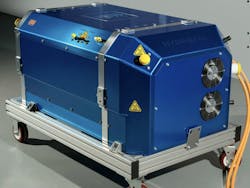GM expanding Hydrogen-based Generators into Mission Critical On-Site Power market
GM has heavily promoted its shift towards e-mobility recently, but this week also expressed its intentions to create a low or no-carbon path for its hydrogen fuel-cell technology into mobile generation, microgrid and on-site power markets.
The automaker announced it is pursuing new commercial applications for its HYDROTEC fuel cell technology. HYDROTEC projects are still under development as a vehicle resource, but GM wants to extend that future reach to mobile power generators (MPGs).
The HYDROTECH MPGs can be used to recharge EVs remotely. In a nod to the mission critical microgrid movement, however, GM also believes the H2 fuel cell-powered generators can be useful for military camps and other on-site installations.
“These fuel cell generators could ultimately replace gas- and diesel-burning generators with fewer emissions at worksites, buildings, movie sets, data centers, outdoor concerts and festivals,” the GM press release reads. “They could also back up or temporarily replace grid-sourced electricity for residential and small commercial enterprises at times of power disruption.”
The C&I Energy Transition—with mission critical users desiring reliable but decarbonized electricity resources— already has inspired on-site power equipment firms like Cummins, Caterpillar, Siemens and Mitsubishi to begin work on hybrid hydrogen-natural gas or even pure H2-fired power generation systems.
The automaker sees a place for itself in that arena.
“Our vision of an all-electric future is broader than just passenger vehicles or even transportation," said Charlie Freese, GM executive director of the global HYDROTEC business. “Our energy platform expertise with Ultium vehicle architectures and propulsion components and HYDROTEC fuel cells can expand access to energy across many different industries and users, while helping to reduce emissions often associated with power generation.”
GM is planning multiple generators all powered by its Generation 2 HYDROTEC fuel cell power cubes. This applications include an MPG to provide fast-charge capability for EVs in the absence of permanent charge points; the EMPOWER RAPID charger to help retail fuel stations add DC fast-charging capacity without expanding the grid; and the palletized MPG for backup or remote use at the mission critical sites such as military bases and data centers.
The HYDROTEC-based power generator can be zero-emissions electricity with output ranging from 60 to 600 kW, according to reports. Hydrogen itself does not emit greenhouse gases when burned, but must be produced from zero-carbon electrolysis to be considered truly green.
-- -- --
(Rod Walton, senior editor for EnergyTech, is a 14-year veteran of covering the energy industry both as a newspaper and trade journalist. He can reached at [email protected]).
About the Author
Rod Walton, EnergyTech Managing Editor
Managing Editor
For EnergyTech editorial inquiries, please contact Managing Editor Rod Walton at [email protected].
Rod Walton has spent 17 years covering the energy industry as a newspaper and trade journalist. He formerly was energy writer and business editor at the Tulsa World. Later, he spent six years covering the electricity power sector for Pennwell and Clarion Events. He joined Endeavor and EnergyTech in November 2021.
Walton earned his Bachelors degree in journalism from the University of Oklahoma. His career stops include the Moore American, Bartlesville Examiner-Enterprise, Wagoner Tribune and Tulsa World.
EnergyTech is focused on the mission critical and large-scale energy users and their sustainability and resiliency goals. These include the commercial and industrial sectors, as well as the military, universities, data centers and microgrids. The C&I sectors together account for close to 30 percent of greenhouse gas emissions in the U.S.
He was named Managing Editor for Microgrid Knowledge and EnergyTech starting July 1, 2023
Many large-scale energy users such as Fortune 500 companies, and mission-critical users such as military bases, universities, healthcare facilities, public safety and data centers, shifting their energy priorities to reach net-zero carbon goals within the coming decades. These include plans for renewable energy power purchase agreements, but also on-site resiliency projects such as microgrids, combined heat and power, rooftop solar, energy storage, digitalization and building efficiency upgrades.

